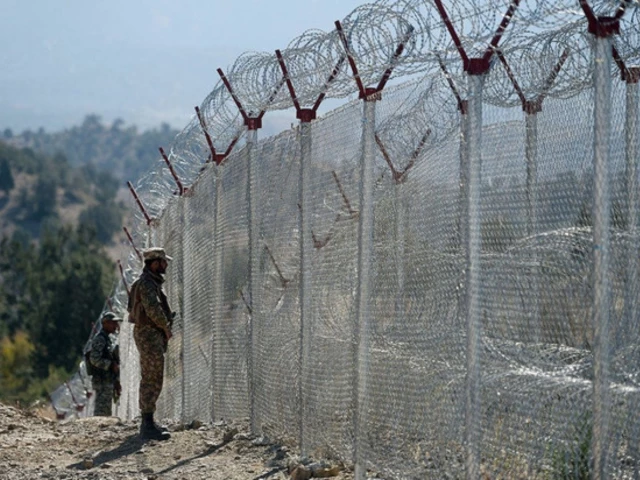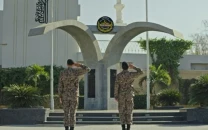Pakistan Army delivers strong response to unprovoked Afghan aggression along border
Security forces' befitting response forced Taliban to flee, destroyed Afghan posts, killing dozens of their soldiers

Clashes erupted along the Pak-Afghan border after Afghan forces opened unprovoked fire at multiple locations in Khyber-Pakhtunkhwa and Balochistan, prompting a swift and forceful response from the Pakistan Army, which destroyed several Afghan posts and killed dozens of Afghan soldiers and terrorists, security sources said on Saturday.
The coordinated assault originated across several key sectors, including Angoor Adda, Bajaur, Kurram, Dir, Chitral in Khyber-Pakhtunkhwa and Baramcha in Balochistan. The firing, security sources said, was aimed at facilitating the illegal entry of Khwarij — the state-designated term for the banned Tehreek-i-Taliban Pakistan (TTP) — into Pakistani territory.
“The Pakistan Army responded immediately and decisively,” security sources said. “The counteroffensive effectively targeted and destroyed multiple Afghan posts at border. Dozens of Afghan soldiers and Khwarij were killed in retaliatory fire.”
Sources said that following the retaliatory strikes, several Taliban fighters abandoned their positions and fled, leaving behind the bodies of their soldiers. “Bodies are scattered, and the posts have been deserted in panic,” security sources confirmed.
Unprovoked firing from the Afghan side at the Pak-Afghan border met with a strong, intense response from the Pakistan Army.
— PTV News (@PTVNewsOfficial) October 11, 2025
Afghan forces opened fire at multiple locations — Angoor Adda, Bajaur, Kurram, Dir, Chitral & Baramcha (Balochistan) — security sources.#Pakistan… pic.twitter.com/LLm3y11wF7
Security sources further added that hideouts of Khwarij and Daesh operating inside Afghanistan under the patronage of the interim Afghan government are being effectively targeted.
According to the sources, Pakistan is employing a combination of artillery, tanks, and both light and heavy weaponry in the operations. “In addition, aerial assets and drones are being used to target Daesh and Khwarij positions,” the security sources said.
The sources also confirmed that headquarters of Afghan forces providing shelter to Daesh and Khwarij elements are being targeted as part of the operation.
The cross-border aggression came at a diplomatically sensitive moment, as Afghanistan’s foreign minister is currently on an official visit to India — a move that has led to a source of high concern in Islamabad.
Security sources believe the timing and coordination of the attack — coinciding with reported terrorists movement along the border — raise serious questions about the role of Afghan forces in facilitating cross-border militancy.
As of late Saturday, the Pakistan Army’s retaliatory operations were reported to be continuing in some sectors, with troops on high alert along the western frontier.
Afghan Taliban appeals for ceasefire
Following Pakistan’s beftitting reply, Afghanistan’s Taliban-led Ministry of Defense announced that it would cease its actions and urged Islamabad to avoid further escalation.
In an statement, the ministry said: “We will now be stopping our retaliatory actions against Pakistan and expect Pakistan to not strike back.”
Naqvi warns Kabul of retaliation
Interior Minister Mohsin Naqvi strongly condemned what he described as “unprovoked firing” by Afghan forces on civilian-populated areas inside Pakistan, terming the attacks a clear violation of international law.
“The firing on civilian populations is an open breach of international law,” Naqvi said in a statement, commending Pakistan’s armed forces for what he called an immediate and effective response.
“Pakistan’s brave forces have demonstrated, through a timely and forceful reply, that any provocation will not be tolerated,” he added.
پاک افغان بارڈر پر افغانستان کی جانب سے بِلا اشتعال فائرنگ/ اپڈیٹ
— PTV News (@PTVNewsOfficial) October 11, 2025
پاکستانی فورسز کی جانب سے مؤثر اور شدید جوابی کاروائی سے متعدد افغان فوجی ہلاک اور خارجی تشکیلیں تتر بتر، سیکورٹی ذرائع
افغان پوسٹیں خارجیوں کو کور فائر دینے میں ناکام، سیکورٹی ذرائع
متعدد افغان پوسٹوں اور… pic.twitter.com/wbgAMZU2iW
The interior minister said that Pakistan’s security forces remained on high alert and were responding appropriately to any aggression. “Our forces are alert, and Afghanistan is being answered with stones for stones,” he remarked, using a local idiom to emphasize a tough countermeasure.
Naqvi also hinted at external involvement behind the latest hostilities. “The pattern of fire and blood we are witnessing in Afghanistan has connections to our perennial enemies,” he claimed, without naming any country.
Reaffirming public solidarity with the armed forces, Naqvi said the people of Pakistan stood united behind the military. “The people of Pakistan stand with our brave armed forces like a wall of steel,” he stated.
Read More: Security forces eliminate 30 terrorists behind Orakzai attack
The minister further cautioned Kabul against what he called “provocative actions,” saying Pakistan would not hesitate to respond firmly. “Afghanistan will be given a decisive response similar to India’s, so that it will not dare cast a covetous eye toward Pakistan,” he said.
K-P faces escalating terror wave
K-P has been grippetd by a wave of extremism and terrorist violence, with terrorists infiltrating across the Afghan border to target both security forces and civilians.
On the night of October 10–11, heavily armed assailants attempted to breach the perimeter of the Police Training School in Dera Ismail Khan district. Six policemen — including trainees — were martyred, while twelve others and one civilian sustained injuries as security forces repelled what officials described as a “cowardly terrorist attack.”
Just days earlier, eleven servicemen, including two officers, had been martyred during an intelligence-based operation (IBO) in one of K-P’s mountainous districts. Nineteen terrorists were reported killed in the same engagement.
Read More: DG ISPR blames K-P lapses for terror surge
In the aftermath, security forces launched a “retribution operation”, targeting militants linked to the Orakzai attack. According to the military’s media wing, thirty terrorists involved in the incident were killed during the operation, conducted earlier this week.
Army warns growing involvement of Afghan nationals in terrorism
Addressing a press conference in Peshawar on Friday, DG ISPR Lt Gen Ahmed Sharif Chaudhry acknowledged the deteriorating security situation and the spike in terrorist activity across the country.
He said Pakistan’s counterterrorism campaign had intensified, with over 10,000 intelligence-based operations conducted in K-P alone this year, resulting in the elimination of nearly 1,000 militants.
The DG ISPR warned that the growing involvement of Afghan nationals in terrorism had further complicated Pakistan’s security landscape. “Afghanistan is being used as a base for carrying out terrorism in Pakistan,” he said, urging the Taliban government to ensure its soil was not used against its neighbour.
Also Read: Major Sibtain Haider martyred in DI Khan IBO, seven terrorists killed
He noted that many of the militants active in K-P maintained links to Afghanistan and were using abandoned US weapons left behind after the 2021 withdrawal.
Lt Gen Chaudhry also cited governance failures and the weak implementation of the National Action Plan (NAP) as key factors behind the resurgence of militancy.
“The vacuum of bad governance is being filled by the blood of the martyred,” he remarked, stressing that effective enforcement of NAP and improved governance in K-P were essential to restoring peace and stability.




















COMMENTS (2)
Comments are moderated and generally will be posted if they are on-topic and not abusive.
For more information, please see our Comments FAQ